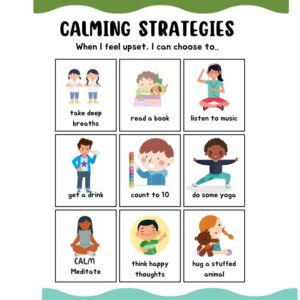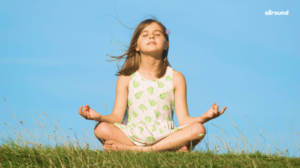12 Fun Little Children’s Meditation Games for Playtime introduces a variety of interactive and educational games designed to help children relax, focus, and enhance their emotional well-being. From breathing exercises to yoga poses and guided imagery, these activities aim to make meditation fun and beneficial for kids of all ages.
Introduction to Children’s Meditation Games
Children’s meditation games are interactive activities designed to introduce mindfulness and relaxation techniques to kids in a fun and engaging way. These games offer numerous benefits for children, including improved focus, reduced stress, enhanced emotional well-being, and better sleep quality.Incorporating meditation games into playtime is essential for children’s development as it helps them build important skills such as self-regulation, emotional awareness, and empathy.
By practicing mindfulness through these games, children learn to manage their emotions effectively, develop a sense of calmness, and cultivate a positive outlook on life.These games can also help children relax, focus, and improve their emotional well-being by teaching them how to stay present in the moment, regulate their breathing, and connect with their thoughts and feelings in a non-judgmental way.
Benefits of Children’s Meditation Games
- Enhanced focus and concentration
- Improved emotional regulation
- Reduced stress and anxiety levels
- Promotion of relaxation and calmness
Breathing Exercises

Breathing exercises are essential for children as they can help improve focus, reduce stress, and promote a sense of calmness. Teaching children proper breathing techniques from a young age can have long-lasting benefits for their mental and emotional well-being.
Little children’s meditation is a powerful tool that can greatly benefit kids in many ways. From improving focus and behavior to reducing anxiety and stress, incorporating meditation into a child’s daily routine is essential. Check out these 8 Reasons Why Little Children’s Meditation Is a Game-Changer to learn more about the amazing benefits it can offer.
Fun Breathing Exercises for Children
- Hot Cocoa Breaths: Have the child imagine they are holding a cup of hot cocoa. Inhale slowly through the nose to smell the cocoa, then exhale gently through the mouth to cool it off.
- Bunny Breaths: Encourage the child to take quick, short breaths in and out through the nose like a little bunny sniffing a flower. This exercise can help increase energy and focus.
- Starfish Breaths: Ask the child to lie down and place a small stuffed animal on their belly. As they inhale deeply, the stuffed animal rises like a starfish, and as they exhale slowly, it goes back down. This exercise promotes relaxation and mindfulness.
Benefits of Breathing Exercises for Children
Breathing exercises can help children calm down during moments of stress or anxiety by activating the body’s relaxation response. By focusing on their breath, children can learn to regulate their emotions and improve their overall well-being.
Mindfulness Activities
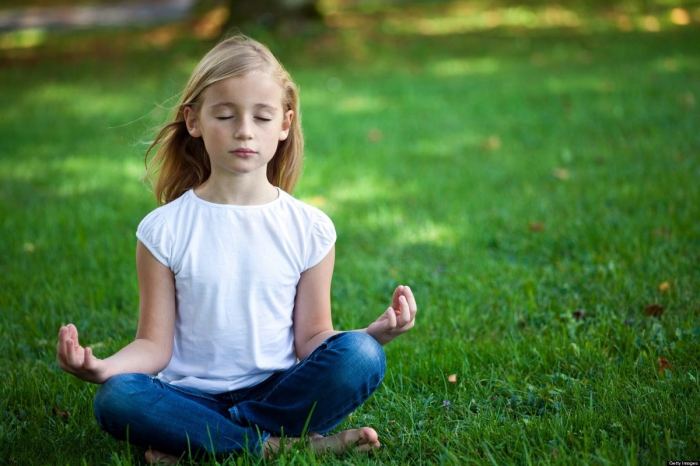
Mindfulness is the practice of being fully present and aware of one’s thoughts, feelings, sensations, and surroundings without judgment. For children, mindfulness can help improve their focus, emotional regulation, and overall well-being.
Sensory Exploration
Sensory exploration activities involve engaging the senses to bring awareness to the present moment. This can include activities like feeling different textures, listening to various sounds, smelling different scents, or tasting different foods mindfully.
Guided Imagery
Guided imagery activities involve using the imagination to create vivid mental images. Children can be guided through a story or scenario that encourages them to visualize and experience different sensations, emotions, and surroundings in their minds.
Breathing Exercises
Breathing exercises are a common mindfulness activity that focuses on deep, intentional breathing. Techniques like belly breathing, square breathing, or counting breaths can help children calm their minds, reduce stress, and improve their concentration.
Body Scan
Body scan activities involve systematically focusing attention on different parts of the body, starting from the head and moving down to the toes. This helps children tune into their physical sensations, release tension, and become more aware of their bodies.
Mindful Movement
Mindful movement activities combine mindfulness with physical movement, such as yoga, tai chi, or dancing. These activities encourage children to pay attention to their bodies, movements, and breath, promoting relaxation and focus.
Yoga Poses for Kids
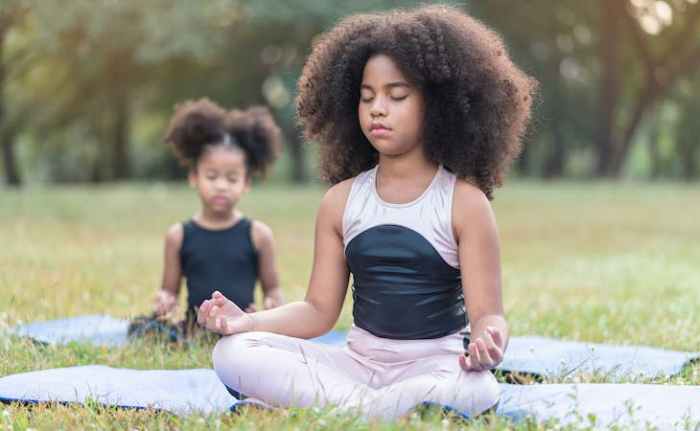
Introducing children to basic yoga poses can have numerous benefits for their physical and mental health. Yoga helps improve flexibility, strength, and overall well-being in children. It also teaches them mindfulness and relaxation techniques that can be beneficial in managing stress and emotions.
Benefits of Yoga for Children:
- Improves flexibility and balance
- Strengthens muscles
- Enhances focus and concentration
- Promotes relaxation and reduces stress
Basic Yoga Poses for Kids:
Here are some simple yoga poses that children can practice:
- Mountain Pose: Stand tall with feet together, arms at your sides
- Tree Pose: Stand on one leg, place the sole of the other foot on the inner thigh or calf
- Downward Dog: Start on hands and knees, lift hips up and back, forming an upside-down V shape
- Child’s Pose: Kneel on the floor, sit back on your heels, stretch arms forward
Guided Imagery Games: 12 Fun Little Children’s Meditation Games For Playtime
Guided imagery games involve using the power of imagination to create vivid mental images. This technique can have a positive impact on children’s creativity, helping them explore new ideas and think outside the box.
Examples of Guided Imagery Games
- Magic Forest Adventure: In this game, children close their eyes and imagine themselves walking through a magical forest. They can encounter talking animals, hidden treasures, and mystical creatures along the way.
- Space Exploration: Kids can pretend to be astronauts floating in space, exploring different planets and encountering alien life forms. This game encourages them to think about the vastness of the universe and use their imagination to create new worlds.
- Underwater Adventure: Children can visualize themselves diving deep into the ocean, swimming alongside colorful fish and discovering sunken treasures. This game stimulates their creativity and helps them learn about marine life.
Stimulating Imagination and Problem-Solving Skills
Guided imagery games can stimulate children’s imagination by allowing them to create detailed mental images and scenarios. This process encourages creative thinking and helps kids develop their storytelling abilities. Moreover, these games can also enhance problem-solving skills as children envision solutions to challenges presented in the guided imagery scenarios. By engaging in these games, kids can learn to think critically and come up with innovative ideas to overcome obstacles.
Nature Connection Activities
Connecting children with nature through meditation games can have numerous benefits for their well-being and mental health. Nature-themed activities like “mindful walks” and “cloud gazing” can help children develop a deeper appreciation for the natural world around them.
Mindful Walks
Taking children on mindful walks in nature can help them connect with their surroundings in a more meaningful way. Encourage them to pay attention to the sights, sounds, and smells of the environment around them. This can help promote relaxation, reduce stress, and enhance their overall sense of well-being.
Cloud Gazing
Cloud gazing is a fun and imaginative activity that can help children feel more connected to nature. Find a comfortable spot outdoors and encourage children to lay down and look up at the sky. Ask them to observe the different shapes and formations of the clouds, allowing their imaginations to run wild. This activity can help promote creativity, mindfulness, and a sense of wonder in children.
Positive Effects of Nature on Children
Spending time in nature has been shown to have a variety of positive effects on children’s well-being and mental health. Research suggests that exposure to nature can reduce stress, improve mood, enhance cognitive function, and increase overall happiness. By incorporating nature connection activities into playtime, children can reap the many benefits that the natural world has to offer.
Little children’s meditation is a powerful tool that can benefit kids in numerous ways. From improving focus and concentration to reducing anxiety and stress levels, meditation is a game-changer for children’s overall well-being. Check out these 8 reasons why incorporating meditation into a child’s routine can make a significant difference in their lives.
Positive Affirmation Games
Positive affirmations are powerful statements that help children develop a positive mindset by reinforcing self-worth, confidence, and optimism. These games are designed to boost self-esteem and cultivate a sense of empowerment in children.
Affirmation Mirror Game
In this game, children stand in front of a mirror and take turns saying positive affirmations about themselves. Encourage them to use phrases like “I am smart,” “I am kind,” or “I am brave.” This activity helps children practice self-love and acceptance.
Affirmation Treasure Hunt
Create a treasure hunt by hiding affirmation cards with positive messages around the house or yard. Children can find the cards and read them out loud to themselves or share them with others. This game not only promotes self-confidence but also fosters a sense of joy and excitement.
Affirmation Storytime
Gather children in a circle and have each child contribute a positive affirmation to create a collaborative story. As each child adds their affirmation, the story unfolds with messages of positivity and encouragement. This game encourages teamwork and creativity while instilling a sense of optimism in children.
Affirmation Jar Game
Fill a jar with written affirmations and have children take turns picking one out and reading it aloud. After reading the affirmation, children can discuss how the message makes them feel and reflect on its meaning. This activity promotes self-reflection and emotional awareness in children.
Affirmation Drawing Challenge
Give children paper and markers to create drawings that represent positive affirmations. Encourage them to illustrate phrases like “I am strong,” “I am unique,” or “I am loved.” This game allows children to express themselves creatively while reinforcing positive self-beliefs.
Creative Visualization Exercises
Creative visualization exercises are a powerful tool for enhancing children’s cognitive development. By engaging their imagination and creativity, these exercises can have a positive impact on various aspects of a child’s mental and emotional growth.
Benefits of Creative Visualization
- Enhances cognitive skills by stimulating the brain’s creative centers.
- Improves focus and concentration as children learn to visualize specific scenarios.
- Promotes relaxation and reduces stress by allowing children to escape into a peaceful mental space.
Imaginative Exercises
- Magic Adventure: Encourage children to visualize themselves on a magical journey, encountering mythical creatures and exploring enchanted lands.
- Dreamy Storytelling: Have children close their eyes and create a vivid story in their minds, incorporating characters and settings of their choice.
Inspiring Creativity and Problem-Solving
Creative visualization can inspire children to think outside the box and approach challenges with a fresh perspective. By engaging in imaginative exercises, kids learn to tap into their creativity and come up with innovative solutions to problems they encounter. This process not only boosts their problem-solving skills but also nurtures a creative mindset that can benefit them in various areas of their lives.
Sensory Play Games
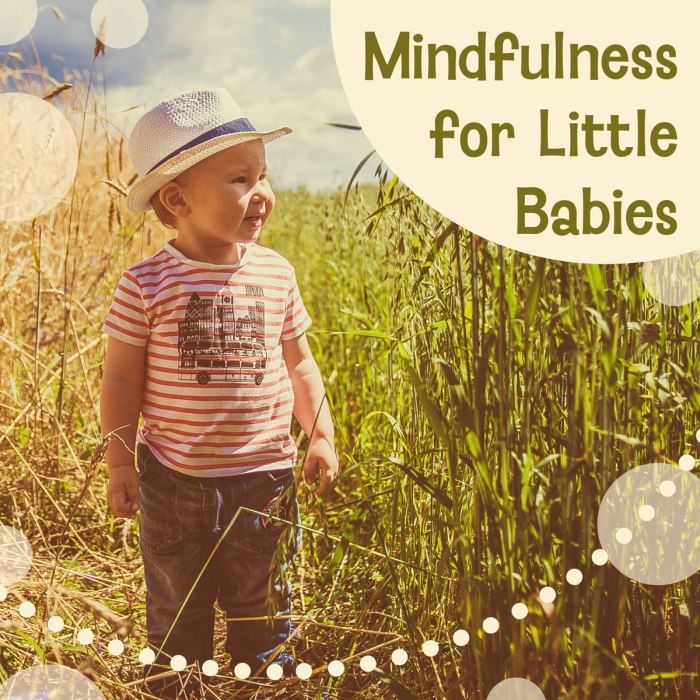
Introducing sensory play activities can be a fun way to promote mindfulness and relaxation in children. Engaging the senses through various games can help kids focus, regulate emotions, and connect with the present moment.
Texture Exploration Game
- Provide a variety of textured objects such as soft fabrics, rough sandpaper, smooth stones, and bumpy toys.
- Encourage children to explore the textures using their hands, feet, or even their faces.
- Ask them to describe how each texture feels and notice any sensations that arise.
Scent Guessing Game
- Prepare jars with different scents like lavender, citrus, mint, and vanilla.
- Blindfold the children and have them guess the scents by taking a whiff of each jar.
- Discuss how each scent makes them feel and if it evokes any memories or emotions.
Sound Concentration Game
- Use instruments, nature sounds, or everyday objects to create a variety of sounds.
- Ask the children to close their eyes and focus on identifying each sound they hear.
- Guide them to pay attention to the pitch, volume, rhythm, and duration of the sounds.
Movement Meditation Games
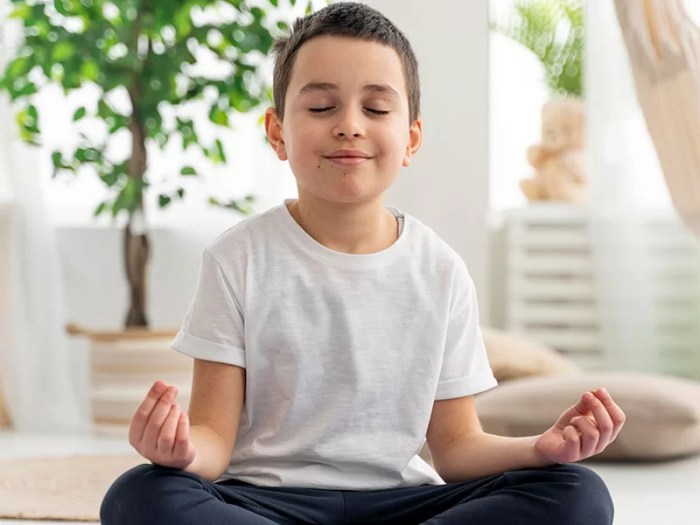
Movement meditation games are a fun way to combine mindfulness and physical activity for children. These games help improve coordination, body awareness, and focus while engaging in playful movements.
Examples of Movement Meditation Games
- Slow-Motion Tag: In this game, children play tag but in slow motion. This encourages them to move mindfully and be aware of their movements.
- Balancing Act: Children can practice balancing on one foot or walking along a line while focusing on their breath. This game helps improve balance and concentration.
Emotional Awareness Activities
Emotional intelligence plays a crucial role in a child’s development, helping them understand and manage their feelings effectively. By promoting emotional awareness and empathy from a young age, children can learn to navigate their emotions in a healthy way, leading to better relationships and overall well-being.
Activity 1: Feelings Chart
- Create a chart with different emotions like happy, sad, angry, and scared.
- Ask the child to point to the emotion they are feeling at that moment.
- Encourage them to express why they feel that way and discuss coping strategies.
Activity 2: Empathy Cards
- Provide cards with various scenarios where someone may feel a certain emotion.
- Ask the child to pick a card and discuss how they would feel in that situation.
- Promote empathy by encouraging them to think about how others might feel in that scenario.
Activity 3: Mindful Breathing
- Guide the child through deep breathing exercises to help them calm their emotions.
- Encourage them to focus on their breath and observe how it affects their feelings.
- Demonstrate how mindful breathing can create a sense of peace and clarity during times of emotional distress.
Closing Thoughts on Children’s Meditation Games
Integrating meditation games into children’s playtime can have numerous benefits for their overall well-being and development. These games help children learn valuable skills such as mindfulness, emotional awareness, and relaxation techniques in a fun and engaging way.
Key Benefits of Meditation Games
- Improves focus and concentration
- Enhances emotional regulation
- Promotes relaxation and stress reduction
- Boosts self-esteem and confidence
- Fosters creativity and imagination
Encouraging Parents and Caregivers
- Set aside dedicated time for meditation games each day
- Participate in the games with your child to show support
- Provide positive reinforcement and encouragement
- Be patient and understanding as your child learns and grows
Creating a Nurturing Environment, 12 Fun Little Children’s Meditation Games for Playtime
- Designate a quiet and peaceful space for meditation activities
- Use soothing music or nature sounds to enhance the experience
- Encourage open communication and expression of feelings
- Practice gratitude and positivity in daily interactions
Embark on a journey of mindfulness and creativity with these 12 engaging meditation games for children. By incorporating these fun activities into playtime, parents and caregivers can nurture a sense of calm and well-being in kids, promoting their overall development and happiness.


